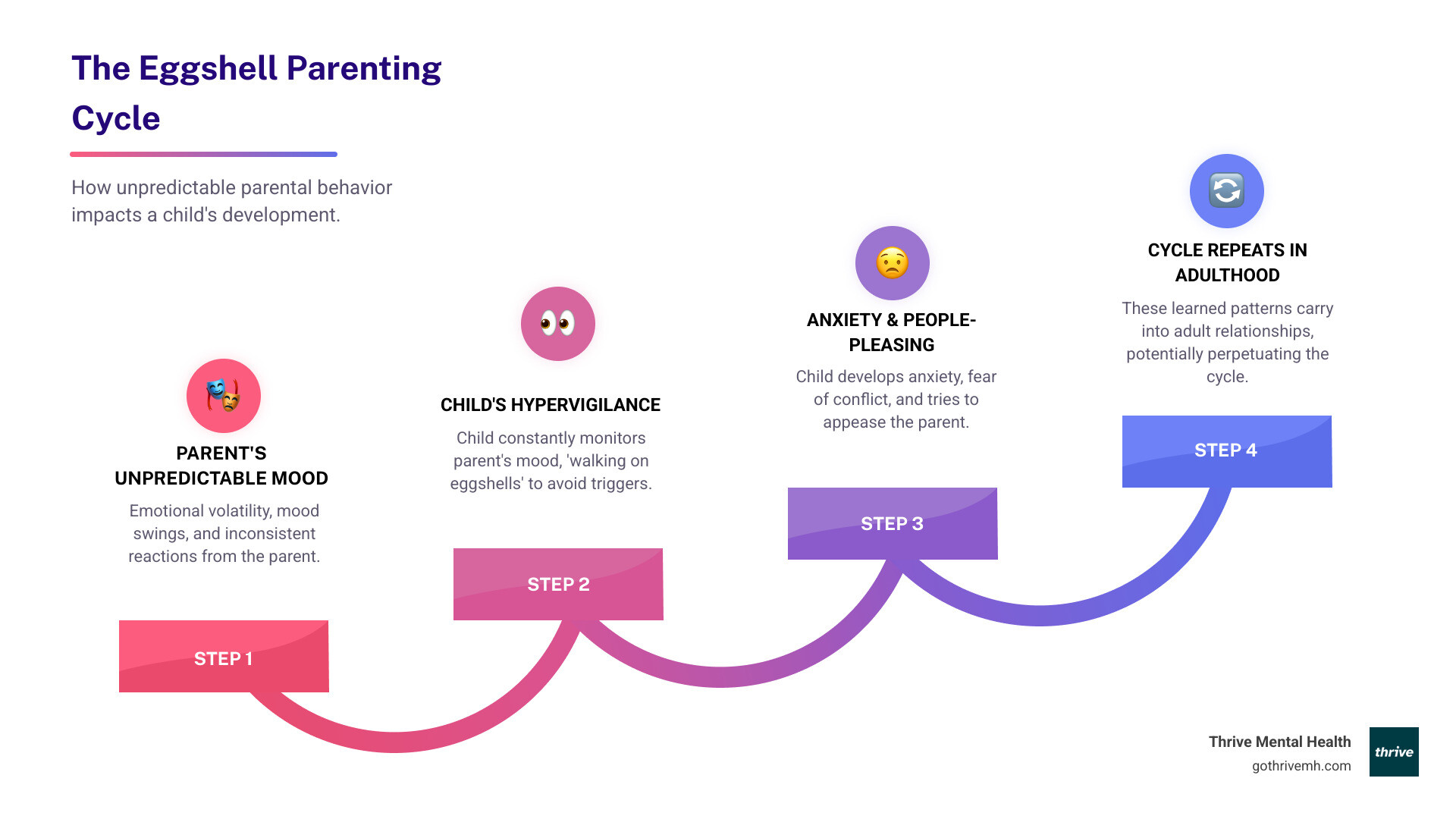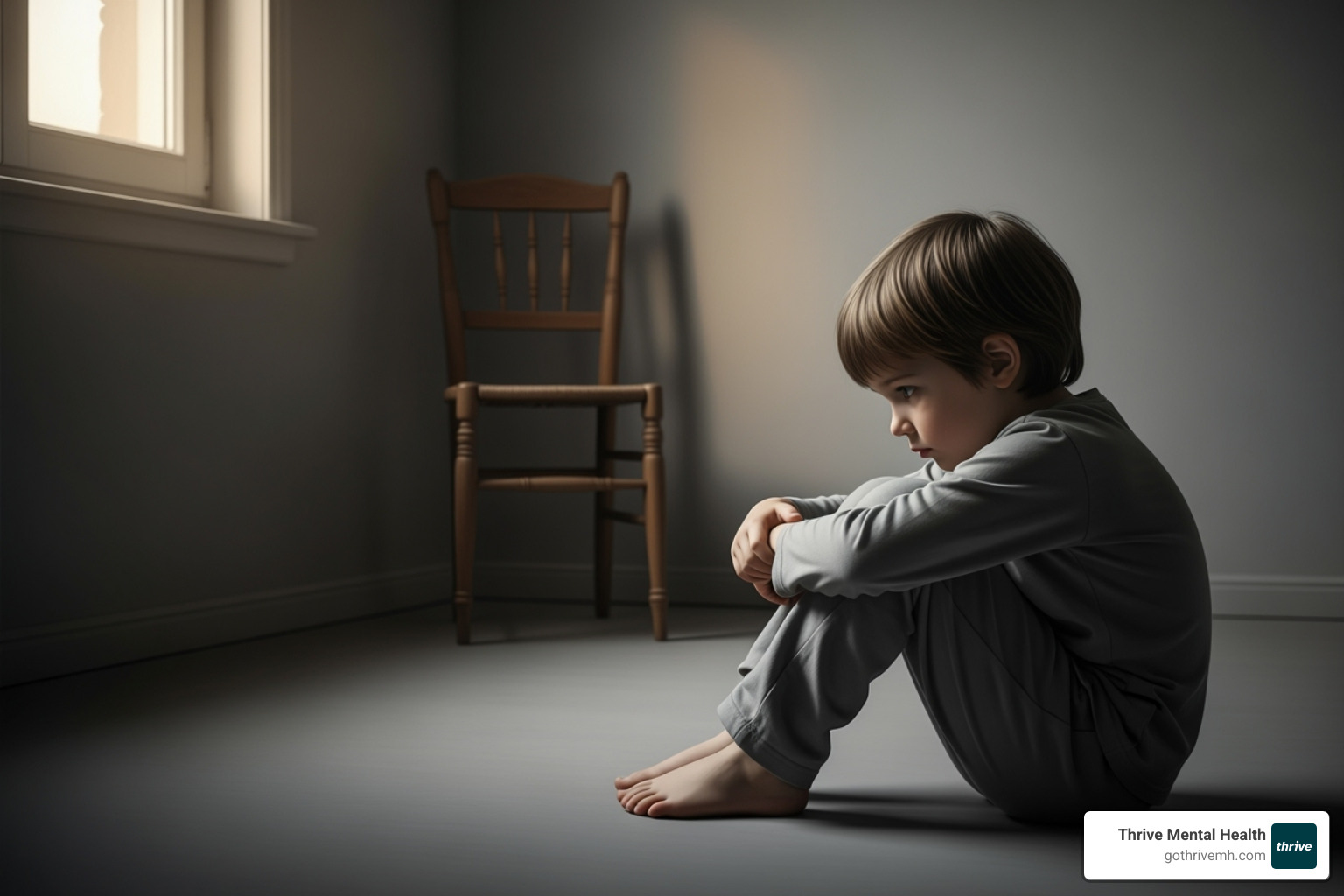An Essential Guide to Eggshell Parenting: Causes, Signs, Healing

Quick Answer: What You Need to Know
Eggshell Parenting: Causes, Signs & How to Heal—12 Ways to Spot It and Recover Faster
Eggshell parenting is a style of parenting marked by emotional unpredictability, mood swings, and volatility. Children feel they must “walk on eggshells” to avoid triggering their parent’s anger, criticism, or emotional withdrawal. One moment, a parent is warm; the next, they’re exploding over something minor. This chronic pattern leaves children in a state of fear and hypervigilance that often lasts into adulthood.
If you’re in crisis, call/text 988 right now. You are not alone.
The term went viral after psychologist Dr. Kim Sage used it to describe this dynamic, resonating with millions who recognized their own childhoods. This guide will walk you through what eggshell parenting is, why it happens, and how to heal.
| Causes | Signs in Children | How to Heal |
|---|---|---|
| Parent’s unresolved trauma | Hypervigilance, anxiety | Self-awareness and therapy |
| Mental health struggles | People-pleasing, fear of conflict | Setting boundaries |
| Intergenerational patterns | Physical symptoms (headaches, stomachaches) | Trauma-informed care (CBT, DBT, EMDR) |
| Poor emotional regulation | Difficulty expressing emotions | Reparenting yourself or changing behaviors |
For parents: The cycle can be broken with self-reflection, stress management, and professional support.
For adult children: Healing involves acknowledging the trauma, setting boundaries, and working with a trauma-informed therapist.
I’m Anna Green, LMHC, LPC, Chief Clinical Officer at Thrive Mental Health. With experience in trauma-informed care, I’ve seen how this dynamic reshapes lives—and how the right support can break the cycle.

What Does Eggshell Parenting Look Like?
Eggshell parenting creates a home where the emotional climate is a volatile storm. A parent’s moods are unstable, reactions are unpredictable, and discipline is inconsistent. Children learn to constantly monitor their parent to avoid an outburst. This isn’t occasional frustration; it’s a chronic pattern of emotional inconsistency.
Defining Characteristics of an Eggshell Parent
Key characteristics often include:
- Unstable mood swings: Shifting from caring to explosive over minor issues, making reactions impossible to anticipate.
- Overly critical or blaming: Constantly pointing out flaws or blaming children for their own emotional outbursts.
- Inconsistent rules and discipline: Rules change with the parent’s mood, leaving children insecure about expectations.
- Emotional outbursts: Yelling, name-calling, gaslighting, threats, or destroying property.
- Poor emotional regulation: The parent struggles to manage their feelings, leading to reactive responses to normal child behaviors.
How It Manifests in Parent-Child Interactions
This dynamic creates a tense atmosphere where connection is difficult.
- Child constantly monitoring parent’s mood: Children become hypervigilant, always scanning for the next emotional shift.
- Fear of sharing experiences: Children suppress their authentic selves, fearing a negative or extreme reaction.
- Parent’s extreme reactions to minor issues: A spilled drink can trigger a disproportionately intense response.
- “Push/pull” dynamic: A confusing cycle of warmth followed by sudden coldness or anger leaves children feeling unsafe and unworthy.
- Enmeshment and parentification: Children may feel responsible for managing their parent’s emotions, sacrificing their own needs for peace.
- Emotional boundaries blurred: The parent’s emotions dominate the child’s world, making it hard for the child to distinguish their own feelings.
The Lasting Scars: Psychological Impact on Children and Adults
The constant unpredictability of an eggshell parent leaves deep, lasting scars on a child’s sense of safety, relationships, and self-worth. These wounds don’t fade with time; they shape how a person steers the world into adulthood.

Negative Impacts on a Child’s Development
Living in a state of chronic stress and high alert takes a significant toll on a child’s development. They may become fearful and withdrawn, suffer from sleep disturbances, and have difficulty concentrating. Pervasive anxiety is common, as children “never know which version of their parent will walk through the door,” according to social worker Jami Dumler. To cope, many develop a fawning response, becoming expert people-pleasers to keep the peace—a survival strategy that often continues into adulthood.
Long-Term Effects and Connection to C-PTSD
The impact doesn’t end with childhood. Adults raised by eggshell parents often struggle with:
- Difficulty sustaining relationships: Trusting others feels impossible when your first relationship was so unpredictable.
- Chronic self-doubt: Years of criticism create a harsh inner voice and a feeling of being a burden.
For many, these experiences lead to Complex Post-Traumatic Stress Disorder (C-PTSD). The Cleveland Clinic notes that chronic exposure to emotionally unsafe environments can cause C-PTSD symptoms like persistent anxiety, flashbacks, and relationship difficulties. These are not personal failings but the result of growing up without guaranteed safety.
The Link to Disorganized Attachment
Eggshell parenting often creates a disorganized attachment style. This happens when “the source of safety—in this case, the caregiver—is also the source of fear,” as therapist Saba Harouni Lurie explains. This paradox makes it incredibly difficult to trust others in adulthood, leading to a push-pull dynamic in relationships that mirrors childhood experiences. Breaking free requires understanding its origins and getting professional support to build new, healthier patterns. For those in Florida, Thrive’s online counseling for trauma can help you work through these deep-seated attachment wounds.
Understanding the “Why”: Common Causes of Eggshell Parenting
Most eggshell parents don’t intend to harm their children. Often, they are struggling with their own unresolved pain and repeating patterns they never learned to heal. Understanding the “why” doesn’t excuse the behavior, but it illuminates the path to breaking the cycle.
Underlying Parental Factors
A parent’s unpredictable behavior is often a symptom of deeper struggles.
- Parent’s own childhood trauma: Many eggshell parents grew up in similar unstable homes. Research confirms that parenting styles are often passed down through generations. Without experiencing emotional safety as a child, it’s difficult to create it for your own.
- Emotional regulation challenges: Some parents never learned healthy ways to manage stress and big feelings. Instead of responding thoughtfully, their nervous system goes into overdrive, and they react explosively.
- Unaddressed mental health concerns: Conditions like anxiety, depression, bipolar disorder, or personality disorders (NPD, BPD) can severely impair a parent’s ability to be emotionally consistent. These are not excuses but explanations that point to a need for professional support.
The Intergenerational Cycle of Trauma
Eggshell Parenting: Causes, Signs & How to Heal often involves addressing patterns that repeat across generations.
- Parenting styles get passed down: Children of eggshell parents internalize these behaviors. Even if they swear to be different, they may unconsciously replicate the patterns they learned under stress.
- Lack of healthy parenting models: Without a roadmap for emotionally regulated care, parents may know what not to do but lack a clear sense of what they should do instead. Therapy can help teach the emotional skills they never received, breaking the cycle.
Breaking the Cycle: Causes, Signs & How to Heal Eggshell Parenting
Recognizing eggshell parenting is the first step toward healing. Whether you’re a parent who sees these behaviors in yourself or an adult child affected by them, breaking the cycle is possible with courage and support.

For Parents: How to Stop Eggshell Parenting Behaviors
Acknowledging the pattern is a powerful first step. Change is within reach.
- Engage in self-reflection: Understand your triggers. Ask yourself what patterns you might be repeating from your own childhood. Pause before reacting.
- Own and repair mistakes: When you lose your temper, apologize sincerely. Saying, “I am sorry I yelled. I did not handle that well,” teaches accountability and rebuilds trust.
- Practice self-regulation: When you feel overwhelmed, use techniques like deep breathing (try 4-7-8 breathing) or taking a “time out” to create space between the trigger and your reaction.
- Set clear, consistent boundaries: Predictable rules and expectations help children feel safe and relaxed.
- Seek therapy: A professional can help you explore underlying causes and learn healthier patterns. CBT, DBT, and trauma-informed care are effective approaches. Connect with our experts at Thrive Virtual Therapy Services.
For Adult Children: How to Heal from an Eggshell Parent
Your healing journey is about reclaiming your sense of self and learning to build healthy relationships.
- Acknowledge the trauma: Your experiences are valid. Allow yourself to grieve the childhood you deserved. This is self-compassion, not self-pity.
- Set firm boundaries: Protect your emotional space by limiting contact or changing topics when conversations become volatile. It’s okay to prioritize your well-being.
- Reparent yourself: Provide the consistent love, validation, and support you lacked. Speak to yourself with kindness and comfort yourself when you struggle.
- Build a support system: Healthy relationships with friends, partners, or support groups can show you what secure attachment feels like.
- Seek trauma-informed therapy: A therapist can help you process the past and build resilience. EMDR is particularly effective for traumatic memories. Learn more about Thrive Online Counseling for Trauma.
The Role of Professional Therapy and Support
Professional help is invaluable for both parents and adult children. Therapy provides a safe space to learn coping skills and develop healthier strategies. Individual therapy focuses on personal healing, while family therapy can improve communication if all parties are willing.
We offer intensive support through our Thrive IOP & PHP Programs. Thrive Mental Health accepts various insurance plans, including Cigna, Optum, and Florida Blue. We encourage you to Verify Your Insurance, which takes just two minutes. For our clients in Florida, we offer virtual and hybrid programs to make care accessible.
Frequently Asked Questions about Eggshell Parenting
You’re not alone in trying to make sense of this difficult dynamic. Here are answers to some of the most common questions.
What’s the difference between eggshell parenting and strict parenting?
Strict parenting involves firm, consistent rules. You know the boundaries, even if they’re rigid. Eggshell parenting is defined by emotional unpredictability, not rules. The same behavior might be ignored one day and trigger an explosion the next, creating constant anxiety.
Can a parent be an eggshell parent without realizing it?
Yes, this is very common. Most are not intentionally harmful. They often struggle with their own unresolved trauma, mental health issues, or poor emotional regulation skills. The volatility is a symptom of their pain, not a conscious choice. Self-awareness is the first step to change.
How do I know if I was raised by an eggshell parent?
If you’re asking, you may already sense it. Common signs in adults include chronic people-pleasing, high anxiety, a deep fear of conflict, constantly scanning others’ moods, and a harsh inner critic. These are survival strategies learned in an unpredictable environment.
Can therapy help heal the effects of eggshell parenting?
Absolutely. The damage is not permanent. Trauma-informed therapy helps both parents and adult children. Approaches like Cognitive Behavioral Therapy (CBT), Dialectical Behavior Therapy (DBT), and EMDR are evidence-based methods that help build healthier patterns.
Is eggshell parenting linked to specific mental health diagnoses?
While not a formal diagnosis itself, eggshell parenting is often linked to a parent’s underlying conditions, such as mood disorders (bipolar, depression), personality disorders (NPD, BPD), or C-PTSD. For the child, the key factor is the chronic emotional unpredictability, regardless of a formal diagnosis.
Insurance Coverage for Therapy in Florida
Healing from Eggshell Parenting: Causes, Signs & How to Heal shouldn’t be complicated by insurance confusion. At Thrive Mental Health, we’ve worked hard to make accessing quality care in Florida as straightforward as possible—because you deserve support without the added stress of navigating a maze of paperwork.
We partner with many major insurance providers, including Cigna, Optum, Florida Blue, and several others. This means there’s a good chance your plan already covers our services. Our virtual and hybrid Intensive Outpatient (IOP) and Partial Hospitalization (PHP) programs are specifically designed for residents in Florida, bringing expert-led, evidence-based care right to where you are.
Whether you’re juggling work, family responsibilities, or simply need the flexibility of virtual care, our programs meet you where you are. We offer evening options to fit your schedule, so you don’t have to choose between your healing journey and your daily commitments.
Not sure if your insurance covers treatment? We get it—insurance can feel like a foreign language. That’s why we’ve made verification simple. You can verify your insurance in just 2 minutes with no obligation. No complicated forms, no pressure—just clarity about what your coverage looks like.
If you prefer to speak with someone directly, our team is ready to help. Call us at 561-203-6085 and we’ll walk you through your options, answer your questions, and help you take that first step toward breaking the cycle of eggshell parenting—whether you’re a parent seeking to change or an adult child ready to heal.
Related Reading
If you’re exploring Eggshell Parenting: Causes, Signs & How to Heal, you might find it helpful to understand some of the related patterns and responses that often accompany this dynamic. Growing up with an eggshell parent shapes not just your childhood, but the way you steer relationships, conflict, and your own sense of safety as an adult.
One of the most common survival strategies children develop in these unpredictable environments is fawning—a trauma response where you learn to constantly appease others to avoid conflict or anger. If you found yourself becoming a people-pleaser who struggles to say no, or if you’re always scanning the room to make sure everyone else is comfortable, this response might feel familiar. Understanding how fawning works and why it develops can be a powerful step in your healing journey. You can learn more in our article on Understanding Fawning: The Behavioral Response Explained.
Another closely related pattern is abandonment trauma. When your primary caregiver was emotionally unpredictable—sometimes present and loving, other times distant or volatile—you may have internalized a deep fear of being left or rejected. This can show up in adult relationships as clinginess, jealousy, difficulty trusting partners, or even pushing people away before they can hurt you. The connection between eggshell parenting and abandonment wounds runs deep, and recognizing these patterns can help you build healthier, more secure relationships. Explore this further in our piece on How Abandonment Trauma Influences Your Relationships.
These articles offer additional context and practical insights that complement your understanding of eggshell parenting. Whether you’re a parent working to change or an adult child learning to heal, knowledge is a powerful tool—and you don’t have to walk this path alone.
Conclusion
The journey to understand and heal from Eggshell Parenting: Causes, Signs & How to Heal is challenging but essential. Recognizing the pattern is the first step. Whether you are a parent seeing these behaviors in yourself or an adult carrying the weight of an unpredictable childhood, know that healing is possible.
The hypervigilance, self-doubt, and fear of conflict you feel are not character flaws; they are survival strategies. For parents, emotional volatility is often a symptom of unhealed wounds, not a sign of being a bad person.
The hopeful truth is that cycles can be broken. With self-awareness and professional support, parents can learn to regulate their emotions, and adult children can find the safety and validation they always deserved. Change takes courage, but you are worth the effort.
At Thrive Mental Health, we’ve seen this change happen. We are here to support you with flexible, expert-led care, including virtual therapy and intensive programs using CBT, DBT, and EMDR. You don’t have to do this alone. Everyone deserves to thrive, not just survive.
Ready for support in Florida? Thrive offers virtual and hybrid IOP/PHP with evening options. Verify your insurance in 2 minutes (no obligation) → Start benefits check or call 561-203-6085. If you’re in crisis, call/text 988.

